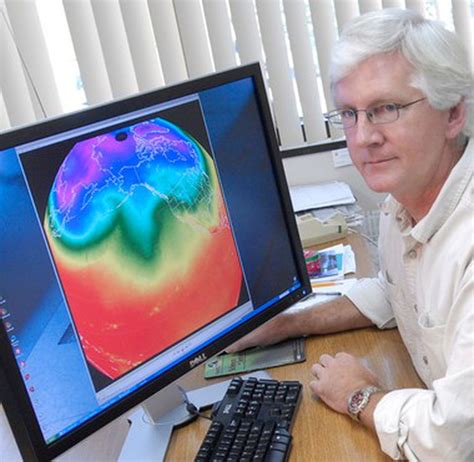A Quote by Barry Gardiner
As we pump greenhouse gases into our atmosphere, the ocean absorbs carbon dioxide, making the seawater acidic and hostile for shellfish and corals.
Quote Topics
Related Quotes
There is universal consensus among experts that the earth's atmosphere is heating up - and that we are responsible for it by putting carbon dioxide in the atmosphere. We also know that the consequences of global warming are catastrophic. But how do we make sure that all countries reduce greenhouse gases?
Carbon dioxide pollution is transforming the chemistry of the ocean, rapidly making the water more acidic. In decades, rising ocean acidity may challenge life on a scale that has not occurred for tens of millions of years. So we confront an urgent choice: to move beyond fossil fuels or to risk turning the ocean into a sea of weeds.
The models that have been constructed agree that when, as has been predicted, the level of carbon dioxide or its equivalent in other greenhouse gases doubles from pre-Industrial Revolution concentrations, the global average temperature will increase, and that the increase will be 1.5 to 4.5 degrees Celsius or 3 to 8 degrees Fahrenheit... In Dallas, for instance, a doubled level of carbon dioxide and other gases like methane, would increase the number of days a year with temperatures above 100 degrees from 19 to 78 each year.
I am troubled by the lack of common sense regarding carbon dioxide emissions. Our greatest greenhouse gas is water. Atmospheric spectroscopy reveals why water has a 95 percent and CO2 a 3.6 percent contribution to the 'greenhouse effect.' Carbon dioxide emissions worldwide each year total 3.2 billion tons. That equals about 0.0168 percent of the atmosphere's CO2 concentration of about 19 trillion tons. This results in a 0.00064 percent increase in the absorption of the sun's radiation. This is an insignificantly small number.
Global warming results not from the emission of greenhouse gases into the atmosphere, but from an unusually high level of solar radiation and a lengthy - almost throughout the last century - growth in its intensity. It is no secret that when they go up, temperatures in the world's oceans trigger the emission of large amounts of carbon dioxide into the atmosphere. So the common view that man's industrial activity is a deciding factor in global warming has emerged from a misinterpretation of cause and effect relations.
Al Gore likes to say that mankind puts 70 million tons of carbon dioxide into the atmosphere every day. What he probably doesn't know is that mother nature puts 24,000 times that amount of our main greenhouse gas-water vapor-into the atmosphere every day and removes about the same amount every day. While this does not 'prove' that global warming is not man-made, it shows that weather systems have by far the greatest control over the Earth's greenhouse effect, which is dominated by water vapor and clouds.
Many of our actions degrade our habitat because we undertake them in order to reach goals whose allure blinds us to myriad dire consequences. In order to fuel our complex civilizations, we are lacing our planet's atmosphere with carbon dioxide, a greenhouse gas that, if it has not already begun doing so, will soon warm the Ice Age climate to which we owe our very existence.


































